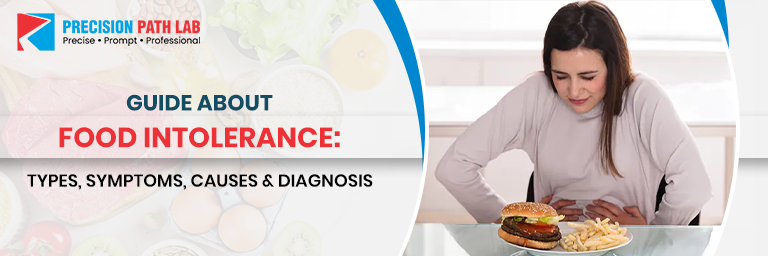
Guide About Food Intolerance
Understanding Food Intolerance: Types, Symptoms, Causes and Diagnosis
Introduction: Food intolerance is a prevalent but often misunderstood aspect of our relationship with food. Unlike food allergies, which involve the immune system, food intolerance refers to difficulty in digesting certain foods. It can cause many symptoms, from mild discomfort to severe distress. In this blog, we will delve into the different types of food intolerance, explore their food intolerance symptoms, and causes, and discuss the diagnosis methods with a focus on the Component Resolved Diagnostics (CRD) allergy test.
Types of Food Intolerance:
Explore various food intolerances, including lactose and gluten, in our guide. Identify symptoms, learn about diagnostic tests, and get a full body checkup in Jaipur tested at the best diagnostic centre for accurate results.
Lactose Intolerance:
Lactose intolerance is perhaps the most well-known type of food intolerance. It happens when the body lacks the enzyme lactase, which is necessary for breaking down lactose, the sugar found in milk and dairy products. Frequent symptoms include bloating, gas, diarrhoea, and stomach cramps. Managing lactose intolerance often involves avoiding dairy products or using lactase supplements.
Gluten Intolerance (Non-Celiac Gluten Sensitivity)
Gluten intolerance, also known as non-celiac gluten sensitivity, is characterized by difficulty digesting gluten, a protein found in wheat, barley, and rye. Unlike celiac disease, gluten intolerance doesn’t involve an immune response, but it can still cause digestive issues, fatigue, and headaches. Individuals with gluten intolerance often find relief by adopting a gluten-free diet.
Fructose Intolerance
Fructose intolerance refers to the body’s inability to absorb fructose properly. Fructose is a type of sugar found in fruits, honey, and high-fructose corn syrup. Symptoms may include abdominal pain, bloating, and diarrhea. Managing fructose intolerance involves avoiding foods high in fructose and monitoring overall sugar intake.
Histamine Intolerance
Histamine intolerance occurs when the body can’t break down histamine efficiently. Histamine is a compound found in various foods, such as aged cheese, wine, and fermented products. Symptoms include headaches, hives, and digestive issues. Individuals with histamine intolerance may benefit from a low-histamine diet and antihistamine medications.
FODMAP Intolerance
FODMAPs, which stands for fermentable oligosaccharides, disaccharides, monosaccharides, and polyols, are a group of carbohydrates that can trigger digestive symptoms in sensitive individuals. Common high-FODMAP foods include certain fruits, vegetables, and grains. Following a low-FODMAP diet under the guidance of a specialist can help manage symptoms.
Sorbitol and Mannitol Intolerance
Sorbitol and mannitol are sugar alcohols commonly used as sweeteners in sugar-free products. Some individuals may experience digestive discomfort, including gas and diarrhea, when consuming foods containing these sugar alcohols. Managing sorbitol and mannitol intolerance involves avoiding products with these additives.
Food Intolerance Symptoms:
The food intolerance symptoms can vary widely but often include:
- Digestive issues such as bloating, gas, diarrhea, or constipation.
- Nausea and stomach cramps.
- Headaches and migraines.
- Fatigue and weakness.
- Joint pain.
- Skin problems like rashes and eczema.
Causes of Food Intolerance
Discover the underlying causes of food intolerance. From genetics to digestive issues, explore factors influencing your body’s reaction to certain foods.
Enzyme Deficiency
Many food intolerances result from a lack of specific enzymes needed to digest certain components. For example, lactose intolerance shows when the body lacks sufficient lactase to break down lactose.
Sensitivity to Food Additives
Some people may be sensitive to certain food additives like preservatives, colourings, and flavourings, leading to intolerance reactions.
Gastrointestinal Disorders
Conditions such as irritable bowel syndrome (IBS) and inflammatory bowel disease (IBD) can contribute to food intolerance.
Diagnosis of Food Intolerance:
Discover precise diagnosis methods for food intolerance. From elimination diets to advanced tests, find the key to understanding your body’s needs.
Elimination Diet
- Description: Removing suspected foods from the diet for a set period, then reintroducing them.
- Purpose: Identifying specific trigger foods.
Hydrogen Breath Test
- Description: Measures the amount of hydrogen in breath after consuming specific sugars.
- Purpose: Detects malabsorption of sugars like lactose and fructose.
Blood Tests
- Description: Measures antibody levels in response to specific food components.
- Purpose: Identifying immune responses, as in celiac disease.
Genetic Testing
- Description: Identifies genetic markers associated with certain food intolerances.
- Purpose: Assessing the likelihood of developing conditions like lactose intolerance.
Properly diagnosing food intolerance is crucial for managing symptoms effectively. Traditional methods include elimination diets, where suspected foods are removed from the diet and reintroduced gradually. However, a more precise approach is the Component Resolved Diagnostics (CRD) allergy test.
Component Resolved Diagnostics (CRD) Allergy Test:
CRD is an advanced diagnostic tool that identifies specific proteins in foods responsible for allergic reactions. It distinguishes between sensitivities to different components, providing a more accurate assessment than traditional testing methods.
This allergy test involves analysing a patient’s blood sample for specific antibodies (IgE) related to food allergies. By identifying the exact proteins causing a reaction, the CRD Allergy Test in Jaipur helps pinpoint intolerances more precisely, enabling tailored dietary recommendations.
Conclusion
Understanding food intolerance is essential for maintaining a healthy lifestyle. Recognizing the types, food intolerance symptoms, and causes allows individuals to make informed dietary choices. Diagnosis, especially through advanced methods like CRD testing – allergy molecular tests, empowers healthcare professionals to provide personalized recommendations for managing food intolerance and improving overall well-being. If you suspect you have a food intolerance, get tested at a pathology lab in Jaipur and consult with a healthcare professional for proper evaluation and guidance.